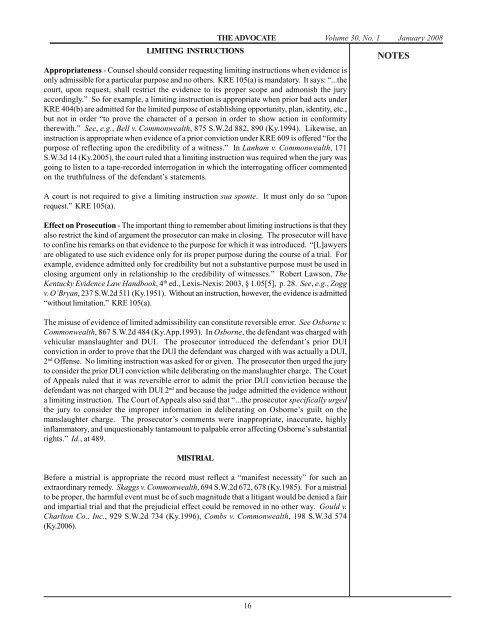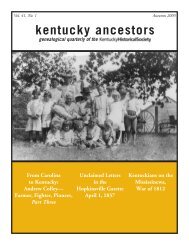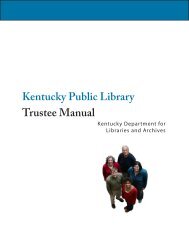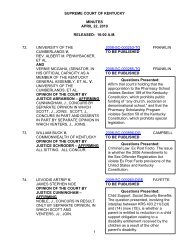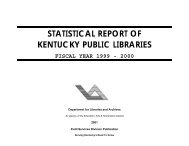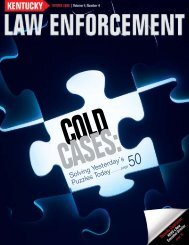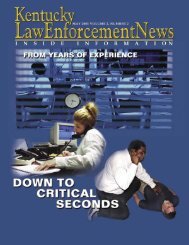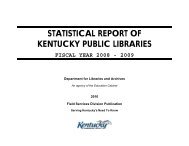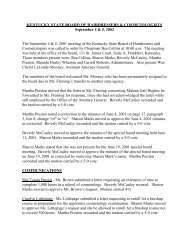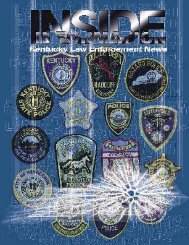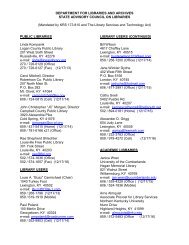Jan08 Advo.pmd - e-archives Home
Jan08 Advo.pmd - e-archives Home
Jan08 Advo.pmd - e-archives Home
Create successful ePaper yourself
Turn your PDF publications into a flip-book with our unique Google optimized e-Paper software.
LIMITING INSTRUCTIONS<br />
THE ADVOCATE Volume 30, No. 1 January 2008<br />
Appropriateness - Counsel should consider requesting limiting instructions when evidence is<br />
only admissible for a particular purpose and no others. KRE 105(a) is mandatory. It says: “...the<br />
court, upon request, shall restrict the evidence to its proper scope and admonish the jury<br />
accordingly.” So for example, a limiting instruction is appropriate when prior bad acts under<br />
KRE 404(b) are admitted for the limited purpose of establishing opportunity, plan, identity, etc.,<br />
but not in order “to prove the character of a person in order to show action in conformity<br />
therewith.” See, e.g., Bell v. Commonwealth, 875 S.W.2d 882, 890 (Ky.1994). Likewise, an<br />
instruction is appropriate when evidence of a prior conviction under KRE 609 is offered “for the<br />
purpose of reflecting upon the credibility of a witness.” In Lanham v. Commonwealth, 171<br />
S.W.3d 14 (Ky.2005), the court ruled that a limiting instruction was required when the jury was<br />
going to listen to a tape-recorded interrogation in which the interrogating officer commented<br />
on the truthfulness of the defendant’s statements.<br />
A court is not required to give a limiting instruction sua sponte. It must only do so “upon<br />
request.” KRE 105(a).<br />
Effect on Prosecution - The important thing to remember about limiting instructions is that they<br />
also restrict the kind of argument the prosecutor can make in closing. The prosecutor will have<br />
to confine his remarks on that evidence to the purpose for which it was introduced. “[L]awyers<br />
are obligated to use such evidence only for its proper purpose during the course of a trial. For<br />
example, evidence admitted only for credibility but not a substantive purpose must be used in<br />
closing argument only in relationship to the credibility of witnesses.” Robert Lawson, The<br />
Kentucky Evidence Law Handbook, 4 th ed., Lexis-Nexis: 2003, § 1.05[5], p. 28. See, e.g., Zogg<br />
v. O’Bryan, 237 S.W.2d 511 (Ky.1951). Without an instruction, however, the evidence is admitted<br />
“without limitation.” KRE 105(a).<br />
The misuse of evidence of limited admissibility can constitute reversible error. See Osborne v.<br />
Commonwealth, 867 S.W.2d 484 (Ky.App.1993). In Osborne, the defendant was charged with<br />
vehicular manslaughter and DUI. The prosecutor introduced the defendant’s prior DUI<br />
conviction in order to prove that the DUI the defendant was charged with was actually a DUI,<br />
2 nd Offense. No limiting instruction was asked for or given. The prosecutor then urged the jury<br />
to consider the prior DUI conviction while deliberating on the manslaughter charge. The Court<br />
of Appeals ruled that it was reversible error to admit the prior DUI conviction because the<br />
defendant was not charged with DUI 2 nd and because the judge admitted the evidence without<br />
a limiting instruction. The Court of Appeals also said that “...the prosecutor specifically urged<br />
the jury to consider the improper information in deliberating on Osborne’s guilt on the<br />
manslaughter charge. The prosecutor’s comments were inappropriate, inaccurate, highly<br />
inflammatory, and unquestionably tantamount to palpable error affecting Osborne’s substantial<br />
rights.” Id., at 489.<br />
MISTRIAL<br />
Before a mistrial is appropriate the record must reflect a “manifest necessity” for such an<br />
extraordinary remedy. Skaggs v. Commonwealth, 694 S.W.2d 672, 678 (Ky.1985). For a mistrial<br />
to be proper, the harmful event must be of such magnitude that a litigant would be denied a fair<br />
and impartial trial and that the prejudicial effect could be removed in no other way. Gould v.<br />
Charlton Co., Inc., 929 S.W.2d 734 (Ky.1996), Combs v. Commonwealth, 198 S.W.3d 574<br />
(Ky.2006).<br />
16<br />
NOTES


